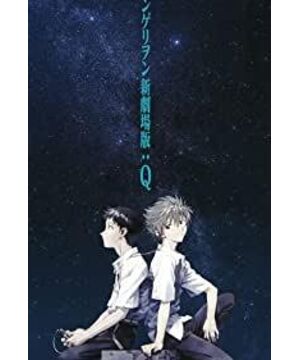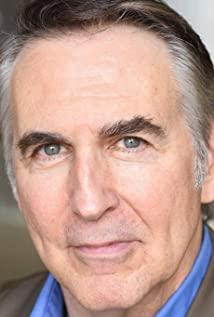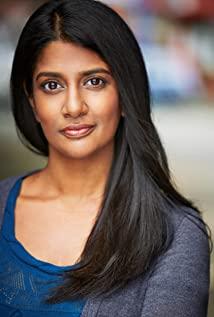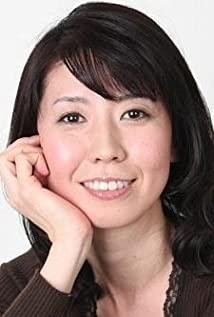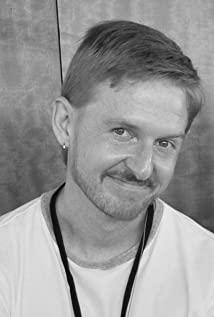Q has the biggest change so far in the new theatrical series compared to the TV version and the old theatrical version. There are different interpretations on this. The first time I saw this movie 7 years after its premiere, I couldn't understand it: there are more characters, the plot has changed, and the background of the times is completely different. The 14-year gap in the era setting and the use of a large number of CG special effects have created a strong sense of strangeness and alienation. This made me sigh: what story did Q tell, and why did it adopt such a method, and is this still the EVA I know?
I clicked on EVA because of the memories of childhood TV and the advertisements in the APP Store of B war, and I picked it up and watched it because I read the answer to the existential & identity crisis that has plagued me repeatedly for more than a year. Out of respect for the previous work, I read some of the reviews. The most instructive is the article " Q - You Can Come Again (Story Structure of Reincarnation) ", which mentions the enlightening "space-time loop" theory. The general idea is that "In "Preface", "Broken", and "Q" each have two completely opposite stories with or without NOT versions", that is, the possibility of both good and bad endings. In the two time and space lines that intersect at the end, Shinji may experience the misery of "order (you are not alone) - broken (you can move forward) - Q (you can't come back)", or "order (you are alone)" - broken (you can't move forward) - Q (you can start over)" happiness.
This time loop/parallel space-time explanation is powerful. In the old film "KOMM, SUSEER TOD (come on, sweet death)" is also corroborated. The song is the lonely monologue of the protagonists in the film, and also wrote the lonely feeling of Shinji facing the new reality in the work "Q" 20 years later. "I wish that I could turn back time, cause now the guilt is all mine. Can't live without the trust from those you love... It all returns to nothing. It all comes tumbling down, tumbling down, tumbling down. It all returns to nothing. I just keep letting me down, letting me down, letting me down." So, to a certain extent, "Q" is in the same vein as the old work, an interpretation of the unfinished.
The following uses the TV version and the old theatrical version as a benchmark, and compares it with the new theatrical version to find the difference, which can also support this statement.
Regarding this method, I think there are a few things to add: First, the explanatory power of this method is limited. Because I am not the director and screenwriter, I do not understand the production thinking and mode of the film, so it may be difficult to distinguish which ones are intentional changes and which ones are deleted due to the time limit of the theatrical version or other constraints. But at the same time, this method has certain value, mainly because the first two parts of the new theatrical version adopt a stricter plot-corresponding creation mode centered on the apostle attack, so the plot changes are clear at a glance, and analyzing the plot changes is also helpful for exploring the author. Intentions have value.
In general, the following differences can be found:
1. In the new theatrical version, Adam is not Lilith in the central dogma; Lilith is on the surface of the moon. This is foreshadowed in the middle and last paragraphs of the "Preface", based on the mask. In the middle of the "Preface", when Shinji resisted driving the EVA again and was taken by Miri to the central dogma area for observation, the giant doll with the same face as the apostle hung on the cross, "Adam"; in the TV version, the central dogma The dolls in the district have seven faces that look like the Seele logo, and Kaoru calls them "Lilith". The deliberateness of this change is further demonstrated at the end of the new theatrical version: when Kaoru talks to Seele on the surface of the moon, in the background is a huge doll with the same face as Seele's logo, namely "Lilith".
This brings us a revelation: that is, in this world line, Adam (or one of them) is not restored to the egg as in the TV version. There is another proof for this, which is the Lost Number of the treasure that the blessing handed over to Ikari Gendo. In the TV version, it is Adam's egg; in "Broken", it becomes the key of Nebuchadnezzar. I'm guessing that because Adam wasn't restored, there was a difference in how the Humans completed/or Ikari Gendo's plan was completed.
2. The above point also has an important influence, which is the raw material for producing EVA. The setting of the TV version is that the first machine (and possibly the zero machine) is the descendant of Lilith, and the gene taken from Lilith is born through cell division, and the rest of the EVA are the gene descendants of Adam. The proof of the former is the dialogue at the Seele meeting and the order of Ikari Gendo who "always give priority to protecting the first machine", and the proof of the latter is what Kaoru said in Chapter 24: "For human beings to survive, even Adam of different races can Dare to copy". In the new theatrical version, this setting has completely changed: all the normal numbering sequences on Earth are descendants of Adam; while the Mark series EVA produced by Tabuga Moon Base is a copy of Lilith. This is proved in "Broken". In "Broken", Ikari Gendo and Dongyue took a spacecraft to observe the Tabuga lunar base, but were not approved to land. Dongyue then said: "As long as you know that the way the moon produces EVA is different, you can."
Why is it different? The most plausible explanation is that the ancestors were different. This theory also explains why in "Broken", Kaoru no longer controls the No. 2 machine through the soul, and why Ikari Gendo no longer orders the protection of the No. 1 machine first.
There are also a few less impactful, but no less important differences:
3. The action of blessing in Europe also induced the apostles, forcing the European No. 5 aircraft to be dispatched to prevent the apostles from entering the Three Ways River area. This also brings a new heroine to the table. 4. Due to the loss of No. 5 aircraft, Europe required Japan to more strictly implement the "Vatican Agreement", which eventually led to the sealing of No. 2 aircraft after No. 3 arrived in Japan, and Asuka instead of Tou Er became the test pilot of No. There is also the reason that the second sister Dong's condition has improved). After Unit 3 was infected and overwhelmed by the dummy plug, Asuka was quarantined and therefore unable to participate in the follow-up battle; while Shinji carried a heavier psychological burden. 5. Because Asuka was quarantined, when the 10th apostle attacked, the new heroine, not Asuka, took the lead in driving the No. 2 aircraft. Therefore, the ending was different from the TV version: Lingbo was swallowed alive, and Shinji woke up for Lingbo. EVA, causing nearly the third shock.
The poster of the finale also contains this moral.
One railroad track, two forked, pointing to three places. Maybe what the poster is referring to is more idealistic: it is more about Shinji's different choices at different times, rather than other objective facts, which ultimately lead to a bright or dark ending: if you have not handed the self-made bento to Limbo, have you realized that? It's a clone, whether to save it at all costs, etc.
What kind of story does the new chapter of the new theatrical version tell? As mentioned above, "Q" is a reinterpretation of the EVA series. One understanding is that "Q" is a new world that is detached from the so far set by EVA - it is a heterogeneous individual, a new possibility - allowing EVA to be stripped of elite, fatalistic, atomic, and local. The shackles of those outdated concepts have made EVA more vivid, better understood by young people, and more recognized internationally. In Wille, the perversion of the new crew and the fact that the battle in the final chapter takes place in Paris is proof of that.
Another understanding is that "Q" shows the ruffian's re-understanding, perhaps a more profound and mature understanding. In "Broken", there is a foreshadowing: After Asuka realized that she could not defeat the apostles alone, she said angrily, "It's good that there are only some elites left in this world", and then realized that she was unreasonable and fell into silence. As a new plot in "Broken", which succeeds the previous work, this paragraph more extreme breaks the dualism in the sense of ontology. The preceding quotation is an example: the elite and the people. In addition, there are humans and apostles, humans and EVA, Japanese and Germans, Americans, Chinese and so on.
This binary division may be one of the attractions of EVA more than 20 years ago: one is the symbolization, mystification, and perhaps the crusade against heterogeneous cultures. As the protagonist, Shinji also constantly struggles with heterogeneous individuals and groups, constantly strengthening the wall of his heart and his awareness of "self", until finally after the third impact of the old theatrical version, leaving behind "the other" Asuka , give up choking her.
Times change. "Q" abandons the dualism in the ontological sense, and puts more emphasis on the concept of construction. An obvious difference between the TV version, the old theatrical version and the new theatrical version is the portrayal of the "professional" group. The TV version and the old theatrical version introduced the concerns of the late 20th century that scientists did not pursue the truth, but pursued the interests of the group brought about by "target substitution", or Foucault-style power (this argument is quoted from "Death and Newborn" beginning). But in the second decade of the 21st century, the argument has gradually died down, partly because of the heightened sense of identity brought about by an increasingly fierce and narrow confrontation. Under the intervention of power, those "professionals" can only use the national border as a gully. In order to get rid of the "loneliness" of the heart wall, they have to rely on a subject. massacre.
"Q" is a product of the new era: Wille, an independent sect of MISATO who used to be in the same camp, fought against Ikari Gendo, while Asuka and Lingbo were their masters. Shinji can also choose between Wille or NERV: he can join one side, but only if he is loyal to that side, completes the objective, and destroys the other side.
But what if, like Shinji, two people who love each other click on the same spot? If atf, the wall of the heart is only open to the enemy, then who is the enemy to you, and who are you the enemy? Perhaps this is why after Shinji woke up, he insisted on restoring the world to its original state. Because he does not want to be an enemy of any human being, and when he wakes up, he has a dream, and things are different.
Twenty years ago, when the old theatrical version came to an end, Shinji rebuilt the wall of the heart, because "that feeling is real", because identity is to define himself with reference to others, because he can feel his own existence. After 20 years, the new theatrical version is coming to an end. Whether the difference in ontology back then was real, or imagined, or constructed, and if it was the latter, why should it be constructed and who should construct it, all these, instead, became questions.
Shinji pursued love and self, but because of the power he had no way of knowing, he destroyed most of the world and was guilty. At the end of "Q", three different people, regardless of previous suspicions, set off towards the life area together. I hope that in the final chapter, Shinji with the original sin will face the new reality, together with Asuka, Reimbo and other humans, to give the answer.
View more about Evangelion: 3.0 You Can (Not) Redo reviews


